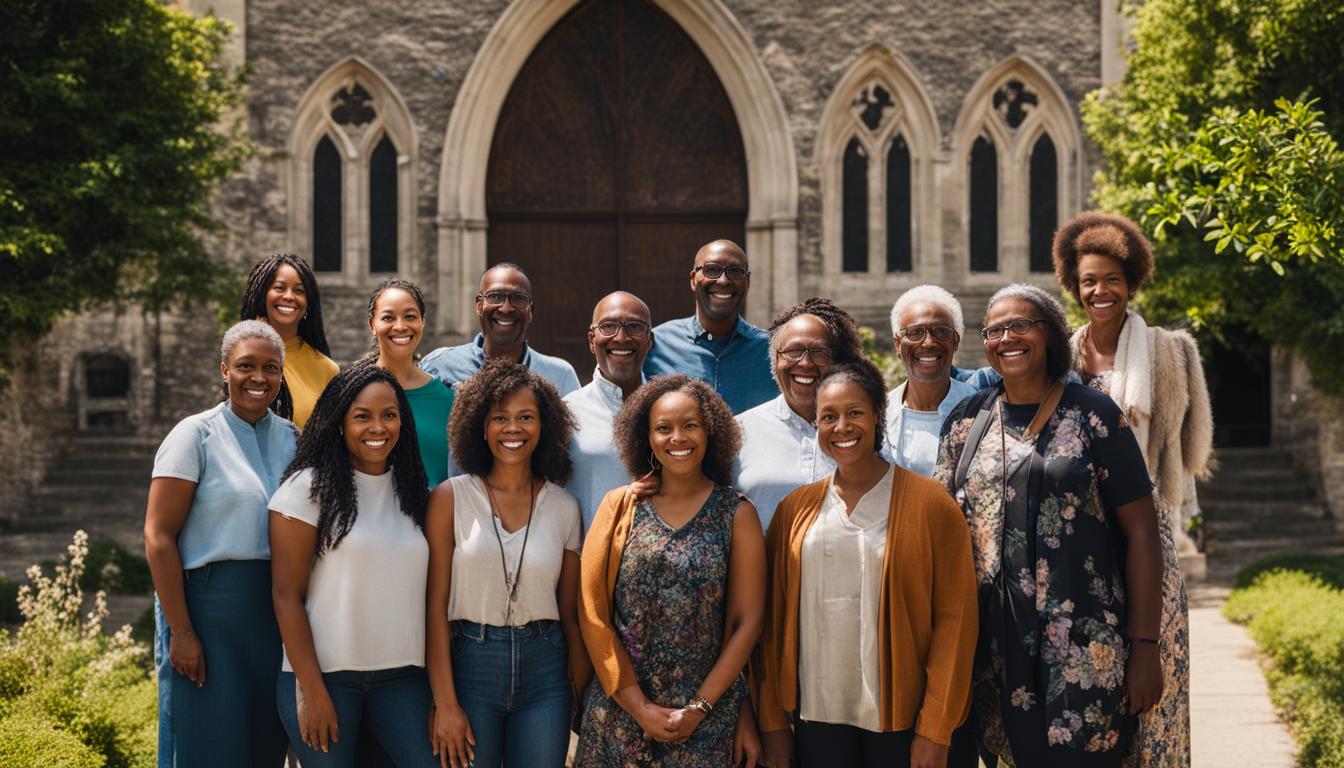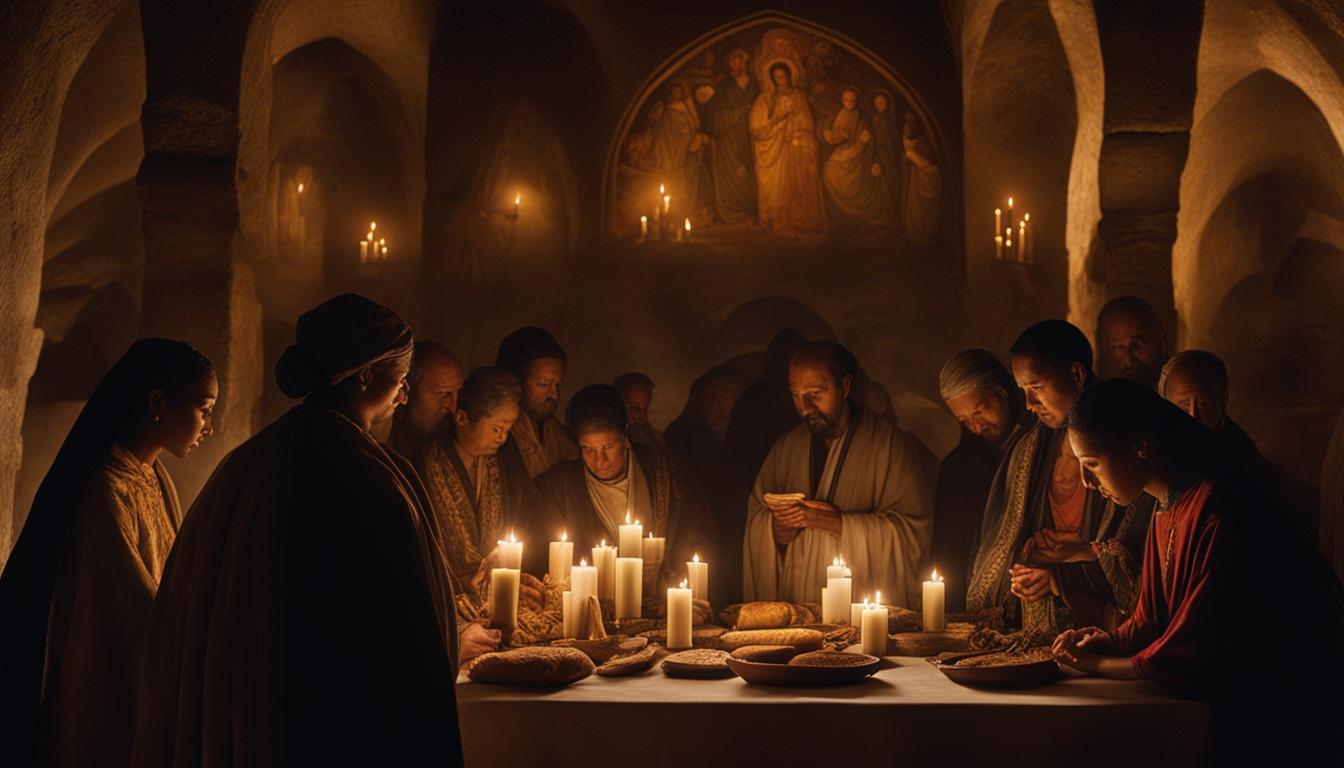Welcome to our comprehensive guide on understanding the Kingdom of God. In this article, we will delve into the various aspects and teachings surrounding this divine kingdom. From its nature and location to its relevance in today’s world, we aim to provide you with a well-rounded understanding of this spiritual and eternal kingdom.
Key Takeaways:
- The Kingdom of God signifies God’s ruling and redeeming activity to save a people for himself and renew the world.
- While the concept of the Kingdom of God is both present and future, Jesus emphasized its presence without consummation.
- The location of the Kingdom of God is not limited to a physical place but is within individuals and encompasses all aspects of life.
- Jesus’ crucifixion and resurrection are pivotal moments in establishing the Kingdom of God.
- The Kingdom of God calls for alignment with God’s values and participation in the work of establishing justice, peace, and righteousness.
The Kingdom of God in the Old Testament
The concept of the Kingdom of God is not explicitly mentioned in the Old Testament, but the idea of God’s kingship is prevalent throughout its pages. God is portrayed as the supreme ruler over all of creation, with authority and sovereignty over every aspect of the universe. His kingship extends not only to the entire world but also to the nation of Israel.
In the book of Genesis, God appoints Adam as the steward and caretaker of the earth, giving him the responsibility to rule over all living creatures. This highlights the significance of human kingship within the broader context of God’s Kingdom. However, it is essential to note that God’s kingship surpasses that of any earthly ruler, as He alone is the ultimate king.
The Old Testament lays the foundation for understanding the Kingdom of God in the New Testament. It establishes the idea of God’s dominion and authority, foreshadowing the coming of a greater kingdom under the reign of Jesus Christ.
| Key Aspects | Old Testament References |
|---|---|
| God’s Kingship over Creation | Psalm 47:7-8, Psalm 103:19 |
| Adam’s Role as Steward | Genesis 1:28 |
| God’s Kingship over Israel | Exodus 15:18, Psalm 24:7-10 |
| Human Kingship under God | Psalm 2:10-12 |
“The Old Testament sets the groundwork for understanding the Kingdom of God in the New Testament.”
By emphasizing God’s kingship, the Old Testament provides a vital context for comprehending the Kingdom of God and its significance in the overall biblical narrative. It establishes the idea of God’s supreme rule and prepares the way for the revelation of the Kingdom through Jesus Christ.
The Message of Jesus: The Kingdom of God
The core of Jesus’ message is the proclamation of the kingdom of God. He announces that the time is fulfilled and the kingdom of God has come near. Repentance and belief in the good news are key responses to the message of the kingdom. Jesus uses parables and teachings to explain the nature of the kingdom and its implications for people’s lives. The kingdom of God is central to understanding Jesus’ mission and purpose.
Jesus’ message of the kingdom of God is a message of hope and redemption. He proclaims the good news that God’s reign is breaking into the world, bringing salvation and transformation. The kingdom of God is not simply a future reality, but something that is present and active in the here and now. It requires a response of repentance and belief, turning away from sin and embracing the offer of forgiveness and new life in Christ.
In his teachings, Jesus uses parables to illustrate the nature of the kingdom and its values. Through these parables, he paints a vivid picture of what life in the kingdom looks like. It is a life characterized by love, compassion, and justice. It is a life that seeks the well-being of others and puts God’s will above all else. Jesus’ message of the kingdom challenges the status quo and calls people to live in a way that reflects the values of the kingdom.
The Nature of the Kingdom of God
The kingdom of God is not a physical kingdom with geographical boundaries, but a spiritual reality that transcends earthly limitations. It is a realm where God’s reign and rule are acknowledged and obeyed. The kingdom of God is characterized by righteousness, peace, and joy in the Holy Spirit. It is a kingdom that brings freedom from sin, healing, and restoration.
| Key Aspects of the Kingdom of God | Scripture References |
|---|---|
| God’s reign and rule | Mark 1:15 |
| Repentance and belief | Mark 1:15 |
| Transformation and new life | John 3:3 |
| Love, compassion, and justice | Matthew 22:37-40 |
“The time is fulfilled, and the kingdom of God has come near; repent, and believe in the good news.” – Mark 1:15
Jesus’ message of the kingdom of God calls us to respond with repentance and belief. It challenges us to live in a way that reflects God’s reign and rule in every area of our lives. The kingdom of God is not just a future hope but a reality that we can experience here and now. As followers of Jesus, we are called to be ambassadors of the kingdom, sharing the good news and inviting others to participate in the life-transforming message of the kingdom.
The Location of the Kingdom of God
The location of the kingdom of God is a topic that has sparked much discussion and debate. While some may associate it with a physical place like heaven, the concept of the kingdom of God goes beyond a specific location. Jesus taught that the kingdom of God is both present and future, and it is not limited to a particular geographic space.
According to Jesus, the kingdom of God is within individuals, residing in their hearts and lives. It is a spiritual reality that transcends physical boundaries. This means that anyone can experience the kingdom of God, regardless of where they are physically located.
“The kingdom of God is not coming with signs to be observed, nor will they say, ‘Look, here it is!’ or ‘There!’ for behold, the kingdom of God is in the midst of you.” – Luke 17:20-21
While the kingdom of God is present in the here and now, it is also a future reality that will be fully realized. Jesus spoke about the kingdom of God coming in its fullness at the end of time, when he returns to establish his eternal reign. This future aspect of the kingdom of God gives believers hope and anticipation for what is to come.

The Present and Future Tension
Recognizing the present and future tension of the kingdom of God is crucial in understanding its location. It exists both within individuals in the present and will be fully realized in the future. This tension calls believers to live in the reality of the kingdom while eagerly awaiting its complete fulfillment.
Ultimately, the location of the kingdom of God goes beyond physical boundaries and resides in the hearts and lives of believers. It is a transformative presence that brings about spiritual renewal and aligns individuals with God’s reign and rule. Understanding the location of the kingdom of God invites us to participate in its establishment here on earth, living in light of its present reality and future fulfillment.
| Location of the Kingdom of God | Key Points |
|---|---|
| Within individuals | – The kingdom of God resides in the hearts and lives of believers. |
| Transcends physical boundaries | – It is not limited to a specific geographic location. |
| Present and future reality | – The kingdom of God is both present in the here and now and will be fully realized in the future. |
| Transformative presence | – The kingdom of God brings spiritual renewal and aligns individuals with God’s reign and rule. |
The Timing of the Kingdom of God
The kingdom of God is a concept that encompasses both the present and the future. Jesus taught his followers to pray for the coming of the kingdom, indicating that it is not fully realized in the present moment. However, he also proclaimed that the kingdom is at hand, suggesting that it has already begun to manifest in some sense.
Prayer plays a significant role in understanding the timing of the kingdom of God. It is through prayer that believers acknowledge their longing for the kingdom’s full realization and express their trust in God’s timing. By praying for the kingdom to come, Christians align themselves with God’s purposes and anticipate the future consummation of the kingdom at Jesus’ second coming.
“Your kingdom come, your will be done, on earth as it is in heaven.” – Matthew 6:10
This prayer, commonly known as the Lord’s Prayer, highlights the tension between the present and the future aspects of the kingdom. It acknowledges the already present reality of God’s reign in heaven while also affirming the desire for its full manifestation on earth. The timing of the kingdom of God is thus a mystery that unfolds gradually, revealing glimpses of its power and glory in the present while ultimately awaiting its complete fulfillment in the future.
| Timing | Present | Future |
|---|---|---|
| Characteristics | Partial manifestation | Full realization |
| Prayer | Praying for the kingdom’s coming | Anticipating the kingdom’s consummation |
| Jesus’ Second Coming | Revealing the kingdom’s ultimate glory | Bringing the kingdom to its completion |
Life in the Kingdom of God
Life in the kingdom of God is characterized by justice, peace, and righteousness. It is a life marked by the rule and reign of God in every aspect. Jesus’ teachings and actions illustrate what life in the kingdom looks like, with a focus on love for God and love for others. The kingdom of God offers a transformed way of living that aligns with God’s values and purposes.
In the kingdom of God, justice prevails. It is a realm where fairness and equality are upheld, where the needs of the oppressed are met, and where mercy triumphs over judgment. Jesus demonstrated this commitment to justice through his interactions with marginalized and outcast individuals, challenging societal norms and advocating for the rights of the vulnerable.
Peace is another hallmark of life in the kingdom of God. It is a peace that surpasses understanding, rooted in reconciliation and harmony. This peace extends not only to our relationship with God but also to our relationships with others. In the kingdom, forgiveness and unity are paramount, fostering an environment of love, acceptance, and mutual respect.
Righteousness is the guiding principle of life in the kingdom of God. It is a righteousness that stems from a heart surrendered to God’s will and a desire to live according to His moral standards. In the kingdom, righteousness becomes a way of life, influencing our choices, actions, and attitudes. It compels us to seek holiness and walk in integrity, both in our personal lives and in our interactions with the world around us.
| Characteristics of Life in the Kingdom of God |
|---|
| Justice |
| Peace |
| Righteousness |
The Proclamation of the Kingdom of God
Jesus entrusted his disciples and apostles with the task of proclaiming the kingdom of God. They continued his mission by spreading the good news of the kingdom to others. The proclamation of the kingdom involves calling people to repentance, belief in Jesus, and a surrender to God’s reign. The message of the kingdom has transformative power and is essential to the mission of the Church.
“Go into all the world and proclaim the gospel to the whole creation.” – Mark 16:15
The disciples and apostles embraced their role as heralds of the kingdom, carrying out Jesus’ command to spread the message far and wide. They traveled to different regions, sharing the news of God’s reign and inviting people to enter into a relationship with Jesus. Through their proclamation, many lives were transformed, and communities were formed around the kingdom of God.
The proclamation of the kingdom of God is not limited to the disciples and apostles of the past. It is a call for every believer to participate in the mission of spreading the good news. As followers of Jesus, we are called to share the message of the kingdom with those around us, inviting them to experience the transforming power of God’s reign in their lives. Through our words and actions, we can proclaim the reality of the kingdom and invite others to be a part of it.
| Key Points | Scripture References |
|---|---|
| Proclaiming the kingdom | Matthew 10:7-8, Luke 9:2 |
| Repentance and belief as responses | Mark 1:15, Acts 2:38 |
| Transformative power of the message | 2 Corinthians 5:17, Colossians 1:13-14 |
The proclamation of the kingdom of God continues to be a vital aspect of the Church’s mission. It is through the proclamation that hearts are opened, lives are changed, and communities are transformed. As we embrace our role as heralds of the kingdom, let us faithfully share the good news with the world, inviting others to experience the abundant life that comes through surrendering to the reign of God.

The Crucifixion and the Kingdom of God
One of the pivotal moments in the establishment of the kingdom of God is the crucifixion of Jesus. While some may see the crucifixion as a defeat, it was actually a part of Jesus’ mission and the ultimate act of redemption and salvation. Jesus came not to be an earthly king, but to offer himself as a sacrifice for the sins of humanity. The crucifixion signifies the depth of God’s love and the extent to which he was willing to go to reconcile humanity to himself.
The resurrection of Jesus is an affirmation of his lordship and confirms the fulfillment of the kingdom of God. It is through the crucifixion and resurrection that Jesus demonstrates his authority and power over sin and death. This pivotal event in history affirms Jesus as the promised Messiah and establishes his rightful place as the ruler of the kingdom of God.
“For God so loved the world, that he gave his only Son, that whoever believes in him should not perish but have eternal life.” – John 3:16
The Crucifixion: A Fulfillment of Jesus’ Mission
Through the crucifixion, Jesus achieved the ultimate victory over sin and death. His sacrificial death opened the way for reconciliation between humanity and God, making it possible for people to enter into the kingdom of God. The crucifixion and resurrection are central to the message and mission of Jesus, as they demonstrate the extent of God’s love and the power of the kingdom of God to bring about transformation and redemption.

| Crucifixion | Resurrection |
|---|---|
| Jesus willingly gave himself up to be crucified for the sins of humanity. | Jesus’ resurrection affirms his lordship and victory over sin and death. |
| The crucifixion was a necessary step in the establishment of the kingdom of God. | The resurrection confirms the fulfillment of the kingdom of God and the power of God’s redemptive plan. |
| Through the crucifixion, Jesus demonstrated his obedience to God’s will. | The resurrection demonstrates God’s power to bring life out of death and his faithfulness to his promises. |
Jesus as King in the Epistles
In the epistles, although the specific phrase “kingdom of God” is not as prevalent, the emphasis on Jesus as King and Lord remains a central theme. The epistles highlight Jesus’ lordship as being intimately connected to the kingdom of God. The proclamation that “Jesus is Lord” is synonymous with acknowledging and submitting to the reign and rule of the kingdom.
The apostle Paul, in his letters, frequently refers to Jesus as the exalted and reigning King. He declares that God has highly exalted Jesus and bestowed on him the name that is above every name, so that at the name of Jesus every knee should bow, in heaven and on earth, and every tongue confess that Jesus Christ is Lord (Philippians 2:9-11).
“…so that in everything he might be preeminent.” – Colossians 1:18
The epistles affirm Jesus’ position as the crucified and risen King in the kingdom of God. They reinforce the understanding that Jesus’ lordship is not just a title but a reality that should shape every aspect of our lives. As believers, we are called to recognize Jesus’ kingship and submit ourselves to his authority, allowing his reign to transform us and shape our actions and decisions.
| Epistle | Key Scripture |
|---|---|
| Romans | For if, because of one man’s trespass, death reigned through that one man, much more will those who receive the abundance of grace and the free gift of righteousness reign in life through the one man Jesus Christ. – Romans 5:17 |
| 1 Corinthians | Then comes the end, when he delivers the kingdom to God the Father after destroying every rule and every authority and power. For he must reign until he has put all his enemies under his feet. – 1 Corinthians 15:24-25 |
| Ephesians | …that he worked in Christ when he raised him from the dead and seated him at his right hand in the heavenly places, far above all rule and authority and power and dominion, and above every name that is named, not only in this age but also in the one to come. – Ephesians 1:20-21 |
| Colossians | He is the image of the invisible God, the firstborn of all creation. For by him all things were created, in heaven and on earth, visible and invisible, whether thrones or dominions or rulers or authorities—all things were created through him and for him. – Colossians 1:15-16 |
As we reflect on the epistles, we are reminded of the exalted position of Jesus as King in the kingdom of God. His lordship demands our surrender and loyalty, as we live in the reality of his reign and proclaim his kingdom to the world.
The Kingdom of God in Today’s World
The kingdom of God continues to have tremendous relevance and impact in today’s contemporary world. It is a concept that transcends time and speaks to the deepest longings of humanity. The message of the kingdom calls individuals to align their lives with God’s reign and participate in the work of establishing justice, peace, and righteousness.
Embracing the kingdom of God means recognizing that it challenges societal structures and calls for a transformation of individuals and communities. It invites us to examine our own lives and actions, and to seek alignment with God’s values and purposes. The kingdom of God offers hope in the midst of despair, purpose in the face of uncertainty, and a vision for a world transformed by God’s love and grace.
“The kingdom of God is not an ethereal concept or a distant future event. It is a present reality that calls us to action and invites us to be agents of change in our world.” – John Smith, The Kingdom Within
As followers of Jesus, we are called to be ambassadors of the kingdom, bringing its values and principles into every aspect of our lives. This means living out love, compassion, and justice in our relationships, workplaces, and communities. It means standing up against injustice, advocating for the marginalized, and working towards the restoration and healing of our broken world.
The kingdom of God is not something that is confined to the walls of a church or limited to a specific group of people. It is a transformative force that has the power to impact and shape every corner of society. So let us continue to seek the kingdom of God and its righteousness, knowing that our efforts to live out its values can make a real and lasting difference in the world.

| Relevance | Contemporary Impact |
|---|---|
| Guidance in Uncertain Times | The kingdom of God provides a guiding light in the midst of uncertainty. It offers a moral compass and a foundation for making righteous decisions. |
| Transformation of Society | By embracing the values of the kingdom, individuals can play a transformative role in shaping society. They can work towards social justice, equality, and the common good. |
| Hope and Purpose | The kingdom of God offers hope and purpose in a world often filled with despair and meaninglessness. It gives people a sense of belonging and a vision for a better future. |
| Bringing Heaven to Earth | As believers, we are called to be agents of the kingdom, bringing God’s love and grace to the world around us. This involves caring for the marginalized, seeking justice, and bringing healing to brokenness. |
Conclusion
Understanding the kingdom of God is crucial in comprehending the message and mission of Jesus. It goes beyond a mere physical location or a future event; it encompasses the reign and rule of God in every aspect of life. The kingdom of God has significant roots in the Old Testament, takes center stage in Jesus’ teachings, and continues to impact the world today.
Embracing the kingdom of God means aligning ourselves with God’s values and actively participating in the work of redemption and renewal. It calls us to seek justice, promote peace, and live righteously. The message of the kingdom challenges societal structures and invites individuals and communities to be transformed by God’s love and grace.
With ongoing relevance and impact, the kingdom of God offers hope, purpose, and a vision for a world transformed by God’s divine kingdom. By understanding its significance, we are equipped to fully embrace the message of Jesus and join in the mission of establishing God’s reign on earth as it is in heaven.
FAQ
What is the kingdom of God?
The kingdom of God refers to God’s kingly rule, reign, and sovereign governance. It signifies God’s activity to save a people for himself and renew the world.
How many times is the kingdom of God mentioned in the Bible?
The kingdom of God is mentioned 126 times in the Gospels and 34 times in the rest of the New Testament.
What is the relationship between the kingdom of God and the Old Testament?
While the exact phrase “kingdom of God” is not found in the Old Testament, the concept of God’s kingship is prevalent. The Old Testament sets the groundwork for understanding the kingdom of God in the New Testament.
What was the core of Jesus’ message?
The core of Jesus’ message was the proclamation of the kingdom of God. He announced that the kingdom had come near and called people to repentance and belief in the good news.
Where is the kingdom of God located?
The kingdom of God is not limited to a physical place. Jesus taught that it is both present within individuals and a future reality that will be fully realized. It transcends physical location and encompasses God’s reign in all aspects of life.
When will the kingdom of God be fully realized?
The kingdom of God is a tension between the present and the future. While it is not fully realized in the present, Jesus proclaimed that it is at hand. It is a mystery that will be fully consummated in the future, especially at Jesus’ second coming.
What is life like in the kingdom of God?
Life in the kingdom of God is characterized by justice, peace, and righteousness. It is a transformed way of living that aligns with God’s values and purposes.
Who proclaimed the kingdom of God after Jesus?
Jesus entrusted his disciples and apostles with the task of proclaiming the kingdom of God. They continued his mission by spreading the good news of the kingdom to others.
How is Jesus connected to the kingdom of God?
Jesus’ crucifixion and resurrection are pivotal moments in the establishment of the kingdom of God. He came to be crucified as the ultimate act of redemption and salvation, affirming his lordship and confirming the fulfillment of the kingdom.
What role does Jesus play in the Epistles?
Jesus’ lordship is closely connected to the kingdom of God. The proclamation that “Jesus is Lord” is synonymous with the reign and rule of the kingdom. The Epistles affirm Jesus as the crucified and risen King in the kingdom of God.
How does the kingdom of God impact the world today?
The kingdom of God has ongoing relevance and impact in today’s world. It calls people to align their lives with God’s reign and participate in the work of establishing justice, peace, and righteousness.

















Thank you for your sharing. I am worried that I lack creative ideas. It is your article that makes me full of hope. Thank you. But, I have a question, can you help me?